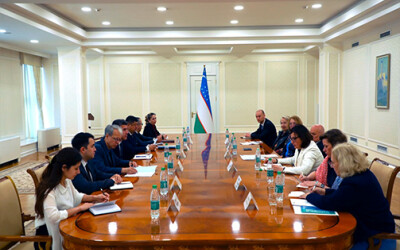ISRS hosted a meeting with the head of the Representative Office of Konrad Adenauer Foundation in Central Asia
On May 7, at the Institute for Strategic and Regional Studies under the President of the Republic of Uzbekistan (ISRS), a meeting was held with the newly appointed head of the Representative Office of Konrad Adenauer Foundation in Central Asia, Andre Algermissen.
During the negotiations, the socio-political and socio-economic transformations ongoing in Uzbekistan, the state and prospects for the development of Uzbek-German partnerships were discussed. A detailed exchange of views was held on cooperation between ISRS and the Foundation in 2024.
During the conversation, the German guest was provided with detailed information about the ongoing reforms in Uzbekistan, foreign policy priorities, including the ongoing work to strengthen good neighborliness, ensure security and stability in Central Asia.
In turn, the representative of the K. Adenauer Foundation A. Algermissen emphasized that Uzbekistan, under the leadership of President Shavkat Mirziyoyev, is carrying out large-scale transformations.
He expressed support for the ongoing reform policy in Uzbekistan, noting the interest of the German side in expanding and deepening mutually beneficial cooperation in all priority areas of the country’s development.
The interlocutors highly appreciated the dynamic development of Uzbek-German relations, which in recent years have entered a new development trajectory, which is confirmed by regular, open and trusting dialogue, including at the highest level.
Parties paid special attention to discussing cooperation between ISRS and K. Adenauer Foundation. They emphasized their readiness to continue close cooperation on a wide range of issues related to strengthening regional cooperation, mitigating and adapting to the effects of climate change, developing transport and communication links, and ensuring food security.
At the end of the conversation, mutual confidence was expressed, that the planned joint events will contribute to the full use of the existing potential of bilateral cooperation.
Previous

On April 30 this year at the Institute for Strategic and Regional studies under the President of the Republic of Uzbekistan (ISRS), a meeting was held with a representative delegation of the “Germany - Central Asia” Parliamentary Group of the Bundestag, led by a member of the CDU/CSU faction of the German Parliament, Manfred Grund.
30.04.2024





